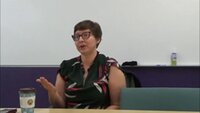| Title |
Choberka, Angela OH19_058 |
| Creator |
Weber State University, Stewart Library: Oral History Program. |
| Contributors |
Choberka, Angela, Interviewee; Langsdon, Sarah, Interviewer |
| Description |
The Beyond Suffrage Project was initiated to examine the impact women have had on northern Utah. Weber State University explored and documented women past and present who have influenced the history of the community, the development of education, and are bringing the area forward for the next generation. The project looked at how the 19th Amendment gave women a voice and representation, and was the catalyst for the way women became involved in the progress of the local area. The project examines the 50 years (1870-1920) before the amendment, the decades to follow and how women are making history today. |
| Abstract |
The following is an oral history interview with Angela Choberka, conducted on September 3, 2019, in the Stewart Library, by Sarah Langsdon. Angela discusses her life, her memories, and the impact of the 19th Amendment.; The following is a video clip of an oral history interview with Angela Choberka, conducted on September 3, 2019. In this video clip, Angela discusses the 'Real Women Run' organization and how the organization impacts and influences women. |
| Image Captions |
Angela Choberka 3 September 2019; Angela Choberka discussing the Real Women Run events and how they influence and impact women |
| Subject |
Women--suffrage; Voting--United States; September 11 Terrorist Attacks, 2001; Women's rights; Montessor method of education |
| Keywords |
Women's organizations; Voting Rights; 19th Amendment |
| Digital Publisher |
Stewart Library, Weber State University, Ogden, Utah, United States of America |
| Date |
2019 |
| Date Digital |
2019 |
| Temporal Coverage |
1971; 1972; 1973; 1974; 1975; 1976; 1977; 1978; 1979; 1980; 1981; 1982; 1983; 1984; 1985; 1986; 1987; 1988; 1989; 1990; 1991; 1992; 1993; 1994; 1995; 1996; 1997; 1998; 1999; 2000; 2001; 2002; 2003; 2004; 2005; 2006; 2007; 2008; 2009; 2010; 2011; 2012; 2013; 2014; 2015; 2016; 2017; 2018; 2019 |
| Medium |
oral histories (literary genre) |
| Spatial Coverage |
Detroit, City of Detroit, Wayne, Michigan, United States, https://sws.geonames.org/4990729, 42.33143, -83.04575; Chicago, City of Chicago, Cook, Illinois, United States, https://sws.geonames.org/4887398, 41.85003, -87.65005; Brooklyn, Kings, New York, United States, https://sws.geonames.org/5110302, 40.6501, -73.94958; Bloomington, Bloomington Township, Monroe, Indiana, United States, https://sws.geonames.org/4254679, 39.16533, -86.52639; Ogden, Weber County, Utah, United States, http://sws.geonames.org/11788968, 41.22809, -111.96766 |
| Type |
Text; Image/StillImage; Image/MovingImage |
| Access Extent |
46 page PDF; Video clip is an mp4 file, 53.2 MB |
| Conversion Specifications |
Filmed using a Sony HDR-CX430V digital video camera. Sound was recorded with a Sony ECM-AW3(T) bluetooth microphone. Transcribed using Express Scribe Transcription Software Pro 6.10 Copyright NCH Software. |
| Language |
eng |
| Rights |
Materials may be used for non-profit and educational purposes, please credit University Archives; Weber State University; Music from Uppbeat (free for Creators!): https://uppbeat.io/t/yeti-music/gentle-breeze; License code: IWGKRYG7XHQOMZY0; Music from Uppbeat (free for Creators!): https://uppbeat.io/t/simon-folwar/hope; License code: KYI5VLB63GF1TXND |
| Source |
Choberka, Angela OH19_058 Weber State University Archives |
| Format |
application/pdf; video/mp4 |
| ARK |
ark:/87278/s69b0vge |
| Setname |
wsu_bs_oh |
| ID |
105468 |
| Reference URL |
https://digital.weber.edu/ark:/87278/s69b0vge |
| Title |
Choberka, Angela OH19_058 |
| Creator |
Weber State University, Stewart Library: Oral History Program. |
| Contributors |
Choberka, Angela, Interviewee; Langsdon, Sarah, Interviewer |
| Description |
The Beyond Suffrage Project was initiated to examine the impact women have had on northern Utah. Weber State University explored and documented women past and present who have influenced the history of the community, the development of education, and are bringing the area forward for the next generation. The project looked at how the 19th Amendment gave women a voice and representation, and was the catalyst for the way women became involved in the progress of the local area. The project examines the 50 years (1870-1920) before the amendment, the decades to follow and how women are making history today. |
| Abstract |
The following is an oral history interview with Angela Choberka, conducted on September 3, 2019, in the Stewart Library, by Sarah Langsdon. Angela discusses her life, her memories, and the impact of the 19th Amendment. |
| Image Captions |
Angela Choberka 3 September 2019 |
| Subject |
Women--suffrage; Voting--United States; September 11 Terrorist Attacks, 2001; Women's rights; Montessor method of education |
| Keywords |
Women's organizations; Voting Rights; 19th Amendment |
| Digital Publisher |
Stewart Library, Weber State University, Ogden, Utah, United States of America |
| Date Digital |
2019 |
| Temporal Coverage |
1971; 1972; 1973; 1974; 1975; 1976; 1977; 1978; 1979; 1980; 1981; 1982; 1983; 1984; 1985; 1986; 1987; 1988; 1989; 1990; 1991; 1992; 1993; 1994; 1995; 1996; 1997; 1998; 1999; 2000; 2001; 2002; 2003; 2004; 2005; 2006; 2007; 2008; 2009; 2010; 2011; 2012; 2013; 2014; 2015; 2016; 2017; 2018; 2019 |
| Medium |
oral histories (literary genre) |
| Spatial Coverage |
Detroit, City of Detroit, Wayne, Michigan, United States, https://sws.geonames.org/4990729, 42.33143, -83.04575; Chicago, City of Chicago, Cook, Illinois, United States, https://sws.geonames.org/4887398, 41.85003, -87.65005; Brooklyn, Kings, New York, United States, https://sws.geonames.org/5110302, 40.6501, -73.94958; Bloomington, Bloomington Township, Monroe, Indiana, United States, https://sws.geonames.org/4254679, 39.16533, -86.52639; Ogden, Weber County, Utah, United States, http://sws.geonames.org/11788968, 41.22809, -111.96766 |
| Type |
Text; Image/StillImage |
| Access Extent |
46 page PDF |
| Language |
eng |
| Rights |
Materials may be used for non-profit and educational purposes, please credit University Archives; Weber State University |
| Source |
Choberka, Angela OH19_058 Weber State University Archives |
| Format |
application/pdf |
| Setname |
wsu_bs_oh |
| ID |
105625 |
| Reference URL |
https://digital.weber.edu/ark:/87278/s69b0vge/105625 |





